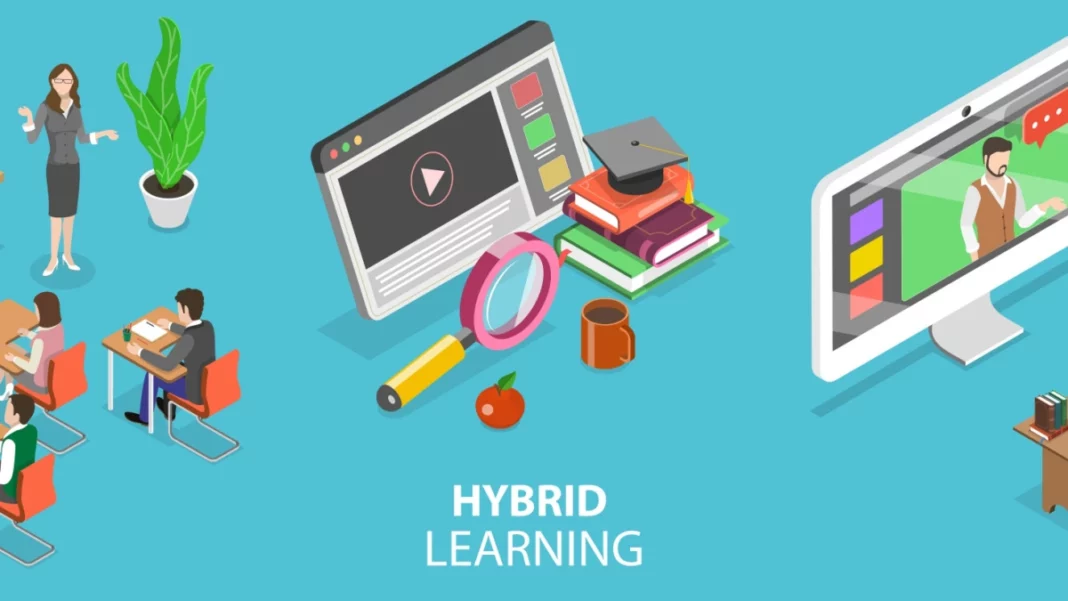In the current era, the importance of advanced technology and digitalisation of every aspect of daily life has been developing drastically. There are very things left for which individuals would not require to be dependent on technology. Starting from communication to transportation, in every aspect of life technology has a wide contribution and so id for education. Education is also becoming digitalised gradually. Several countries have now officially implemented hybrid education systems such as France, Italy, Japan, Korea, China, Argentina, Austria, Bolivia, Brazil, and many others. India is also one of them.
The implication of hybrid learning was not much emerging in India like other countries before the outbreak of the COVID-19 pandemic. The concept of future education and learning through digitalised way was introduced in India but there were no proper implications. But the social distancing norms levied by the government in India due to the pandemic forced the implementation of a hybrid learning system. Students from both schools and colleges started online classes provided by the teachers. Currently, the complete education system of India is dependent on a hybrid learning system as most of the schools and colleges are closed due to the pandemic situation.
What is Hybrid Learning?
Hybrid learning can be understood as a learning approach towards education that associates the traditional learning method of the in-person classroom approach and online materials for education. It requires the physical presence of both learner and teacher. Physical presence for hybrid learning does not necessarily mean being present in the classroom. Physical presence in hybrid learning also can be maintained by utilising advanced technological tools such as video calling.
With help of developed and innovative technology, these days individuals can conduct video calling through their smartphones, desktop, laptop and tabs. And conducting video calling through these digital devices is also quite simple because of these free video calling apps such as Zoom, Google Meet, Skype, Cisco Webex Meetings and many more. Through these video calling applications, more than two people will be able to join one video call and conduct online classes. Through video calling with chat support, teachers will be able to provide any resources and educational materials for students which will be easily accessible for them.
Apart from this process, there are also other forms available for hybrid learning. For instance, while conducting teaching in the classroom, teachers include asynchronous learning materials such as pre-recorded video instruction and online exercises. These procedures also can be considered hybrid learning. In the traditional learning method, teachers and students only use books and copies for teaching and making notes and for other educational exercises. But in hybrid learning, even after conducting classroom learning, teachers and students uses learning materials from the internet and uses technological devices to support and enhance the learning procedure. It enhances the effectiveness of learning.
Related Article: Using Byju’s App in a Post Pandemic World: A New Perspective
Advantages of Hybrid Learning
Associating the traditional educational approach and the future learning style with advanced technological features, hybrid learning has a wide range of advantages. These are just a few of the benefits that any individual could obtain from hybrid learning.
– Improvement in grades because through hybrid learning students will be able to get access to a wide range of study materials in form of research papers, journal articles that are available on online websites.
– Ability to learn at your own pace. Most of the time it has been observed that every student in one class does not have a similar learning pace. It is problematic for both types of students, either a faster learning pace or a slower learning pace. In hybrid learning, they will be able to study at their own pace with proper time management as per their convenience.
– Better sense of accomplishment. Hybrid learning provides various opportunities for students to explore their studies. It provides freedom of sovereign academic exploration. For instance, freedom of time management, selecting a learning method, appropriate place for studying for better focus. Due to all these reasons, students get a better sense of accomplishment.
– Increased student engagement. Hybrid learning offers the opportunity of having intimacy and immediacy of in-person discussion regarding academic matters. It reinforces group work in form of making group presentations, developing discussion regarding any subject. It enhances student engagement and communication.
Hybrid learning is a beneficial approach in the classroom, especially when it comes to educational instruments and resources that aid teachers in educating their students in a collegiate environment. However, as with all things, there are pros and cons to both traditional methods and those of a hybrid nature.
The benefits of the traditional instructional approach lie primarily in the teacher’s classroom management abilities and authority. As a teacher, you can set the rules for your classroom and your students will follow them. This is not an option in a hybrid learning environment. A student has the ability to study at his or her own pace when he or she wants to. Teachers are not able to give students seatwork, homework, exams, projects, etc. Students are in charge of their education and this is both a benefit and a disadvantage in the classroom.
This type of learning is beneficial because it allows the student to learn at his or her own pace without feeling rushed or behind others in the class who may be better learners.
Also Read: How to Improve Communication Skills?



